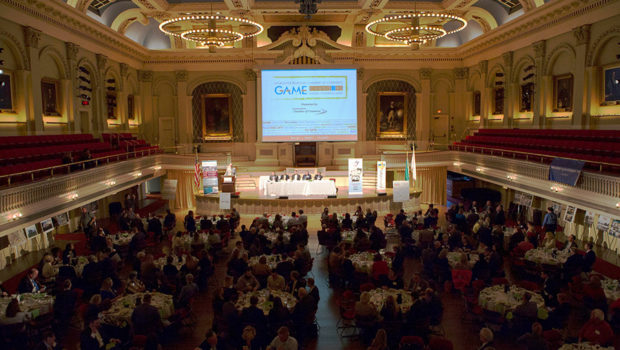Game-changers from across Worcester and Central Mass. got together at Mechanics Hall Oct. 14 to celebrate business innovation while envisioning ways to attract even more development to the city.
“The fact that we can match our history with being the most innovative state in the country is really a sweet spot to be in,” says Lt. Gov. Karyn Polito.
Polito says economic initiatives the Baker Administration has brought to fruition with her assistance are helping that effort. These include a MassWorks grant to help enable the deal with Franklin Realty Advisors and the CitySquare project. Also, impressing the importance of Worcester Regional Airport upon MassPort board members. Furthermore, advocating for the new Heart to Hub Express Train from Worcester to Boston is notable. Moreover, resolving environmental issues to facilitate a first class renovation of the 100-year-old WRTA site on Quinsigamond Avenue.
The lieutenant governor adds that a recent $5 million grant to invest in life scopes at UMass Medical Center is another true breakthrough. There are only a handful of scopes in New England that assist researchers in better understanding the inner workings of the atom. Their development could lead to more individualized medicines.
“We need to utilize our assets better. We’re one of the largest property owners in the Commonwealth,” Polito said. “Why not put parcels that are not being utilized to better use? That turns into tax revenue and brings in more jobs.”
Polito lauds future bio-manufacturing site
One unfolding example of that vision, Polito adds, now exists at the site of the Worcester State Hospital recovery center near UMass Medical School. That’s where an 80-acre site will soon be re-utilized as 500,000 square feet of future bio-manufacturing firms. This could generate 400-500 good paying jobs.
“Our biggest asset is people and our biggest opportunity,” Polito says. “If we’re not matching through our education system what’s happening in the workplace, then we are not being as competitive. We’re losing market share. Our commitment is building the nation’s highest skilled workforce.”
This educational component, Polito adds, is evident in Worcester with the growing demand for more skilled manufacturing workers. The states has seen manufacturing employment losses of more than 112,000 between 1996 and 2006 alone. A straight line projection suggests the remaining 300,000 manufacturing jobs in Massachusetts will completely disappear by 2025. That is unless new workers are identified and an aging workforce retrains.
QCC involved in specialized training
To combat that glaring statistic, the state is helping to expand Worcester Tech’s veterinarian medicine training capacity . Also, the Commonwealth is developing manufacturing workforce pipelines at Quinsigamond Community College and WPI. In addition, the state recently kicked in $200,000 in urban agenda grants to help low income families obtain manufacturing training and jobs. That’s part of a larger $9.3 million in workforce training capital funds and another $12 million to help re-train an aging manufacturing workforce.
Jack Healy, who founded Mass Manufacturing Extension Partnership in 1999, received an award at Game Changers for his decades of vision. In accepting the honor, Healy said the recent workforce development partnership between area vocational schools and colleges have helped retrain 300 long-term unemployed people with new skills. Additionally, the program helps place new graduates into high paying manufacturing careers.
“The average manufacturer for every $1 invested with us gets $28 in return,” Healy says. “Worcester has 20 percent of its gross domestic product in manufacturing private industry.”





